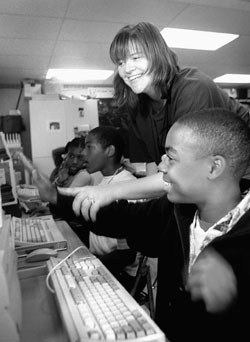|
HOME | SEARCH | ARCHIVE |
|
Berkeley program helps teachers bring technology into the classroom
By D. Lyn Hunter, Public Affairs
| |
 |
-Claire Stoermer, teacher
"What do you mean WWF is weak? The WWF is tight, especially 'The Rock.' He's cute and is so famous for his moves. I think I would like your dad because anybody that likes the WWF is the bomb. I know that it's fake, but it's exciting and humorous. You really need to watch it because me and most of the kids in this whole school like wrestling."
- Alyssia Knox, student
This passionate exchange between a teacher and her student at Oakland's John Swett Middle School is more than an airing of opinions on the World Wrestling Federation. It's also an exercise in using technology to improve writing skills.
Stoermer posted her comment on a Web site discussion board - created especially for her 7th grade class - to get the students to analyze and write about their feelings on various issues. Their responses, sent via e-mail, are posted on the board and read by Stoermer, adult mentors and other students.
Most discussions center around books and reading, but every now and then, a "hot" topic, such as the WWF, gets vetted.Virtual classrooms, like Stoermer's, are popping up in schools across Oakland, thanks to a collaboration with the Bay Area Writing Project's Technology and Writing Program, housed in the Graduate School of Education. The program is one of several Internet Learning Community projects, sponsored by Berkeley's Interactive University.
"The technology allows students to get immediate feedback from others on what they've written," said Stoermer. "This really motivates them to write more. The ongoing dialogue allows them to continue their thought processes on a particular subject over time, instead of just writing a paper, turning it in, then waiting for a grade from me."
In addition to the discussion board, students also receive feedback on biographies they've written about someone close to them, which are posted on their own home pages.
This year, Stoermer is taking it a bit further and partnering with a class in Iowa to form mini book clubs, where students will discuss a book they are reading.
"For our project with the Oakland school district, we created a series of workshops and institutes for teachers who want to learn how to integrate technology into the teaching of writing," said Carol Tateishi, Bay Area Writing Project director. "They learn technical skills, like how to create Web sites and use desktop publishing, and, using these skills, develop methods of teaching that improve their students' writing."
Stoermer attended the project's training programs, and created her classroom electronic bulletin board as a result. A feature of Stoermer's site is the use of mentors, adults from outside the classroom who, over the Internet, engage in discussions with students about books and other topics.
Reading and online discussions about books are key ingredients for improving writing skills, said Tateishi.
"At the beginning of school year, the students were asked who their favorite author was, and most had no answer," said Patrick Delaney, a class mentor and a teacher consultant trained by the Bay Area Writing Project. "By end of year, each could name at least three different writers."
While working with technology has opened new doors for Stoermer's students, there are many challenges to overcome. Each day, she and her 30 pupils squeeze into a small, cramped portable classroom with only one Internet connection, which works intermittently. "It's the least optimal situation for learning," said Delaney, a middle-school teacher in San Francisco who also helped train Stoermer.
As in other schools in urban areas, many of Stoermer's students are just learning English, are from low-income families and are struggling with reading and writing skills. Said Delaney: "Every challenge you can think of is there."
But that hasn't stopped Stoermer and other teachers who participate in the Bay Area Writing Project/Interactive University program from getting their kids excited about writing using technology.
"Our mission is to improve the achievement of students through the professional development of teachers," said Tateishi. "Teaching them how to use technology gives them another tool to enhance learning."
The structure of the program with the Oakland school district - where teachers, who have an intimate understanding of classroom dynamics, instruct other teachers on how to use technology in the classroom - has proven successful.
"The idea is to help
Oakland build a cadre of teachers who have gone through our professional
development programs," said Tateishi, "so when the grant money runs out,
they will be able to instruct other teachers in their district and keep
the cycle going."
Home | Search | Archive | About | Contact | More News
Copyright 2000, The Regents of the University of California.
Produced and maintained by the Office of Public Affairs at UC Berkeley.
Comments? E-mail berkeleyan@pa.urel.berkeley.edu.